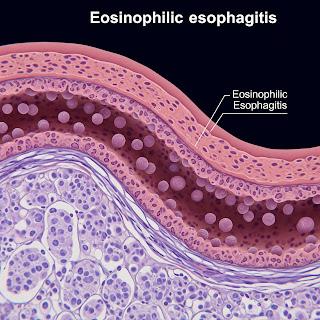Eosinophilic Esophagitis Uncovered: CI Insights into Emerging Therapies and Market Shifts

Eosinophilic Esophagitis (EoE) is a chronic, immune-mediated inflammatory disease of the esopha*** that has rapidly transitioned from under-recognized to a major focus in gastroenterology. Driven by food allergens and characterized by eosinophilic infiltration of the esophageal lining, EoE leads to progressive esophageal dysfunction. The condition is now managed with a combination of diet, medication, and emerging biologics, reflecting a growing shift toward individualized, inflammation-targeted care.
Request a sample copy of the CI report at:
https://www.datamintelligence.com/download-sample/alpha-1-antitrypsin-deficiency-therapy-market
Understanding the Pathogenesis of EoE
EoE is triggered by environmental and food allergens that stimulate a type 2 helper T-cell (Th2) immune response. This immune activation leads to the release of interleukins (IL-4, IL-5, IL-13), driving eosinophil accumulation and inflammation within the esophageal epithelium.
Persistent eosinophilic inflammation results in:
* Mucosal damage
* Fibrosis and esophageal remodeling
* Strictures and dysphagia
* Food impaction risks
Though most common in young males and individuals with allergic conditions (asthma, eczema, allergic rhinitis), EoE affects all age groups.
Signs, Symptoms, and Diagnosis
The presentation of EoE varies by age:
* Children: feeding difficulties, failure to thrive, abdominal pain
* Adolescents/***s: dysphagia, chest discomfort, food impaction
* Endoscopy with biopsy is essential for diagnosis, revealing:
* Rings (trachealization)
* Linear furrows
* White exudates
* Strictures
Histology confirms ≥15 eosinophils per high-power field. Exclusion of other causes (e.g., GERD) is critical for diagnosis.
Treatment Landscape: From Elimination to Immunomodulation
EoE therapy targets both inflammation control and symptom relief. The mainstays include:
1. Dietary Therapy
* Elemental diets (amino acid-based formulas): highest efficacy, lowest adherence
* Six-Food Elimination Diet (SFED): avoids dairy, wheat, soy, egg, nuts, seafood
* Targeted elimination guided by allergy testing or empirical response
Repeat endoscopy is used to assess histologic response.
2. Pharmacologic Therapies
* Proton pump inhibitors (PPIs): first-line for mild disease
* Topical corticosteroids (e.g., budesonide, fluticasone): effective in reducing eosinophilic inflammation without systemic side effects
* Systemic steroids are reserved for severe or refractory cases
Biologics: Precision Treatment for Refractory EoE
Biologic therapies are redefining treatment in patients unresponsive to diet or steroids:
* Dupilumab, an IL-4/IL-13 receptor blocker, is the first FDA-approved biologic for EoE (2022).
* Clinical trials are underway for agents targeting IL-5 and Siglec-8 pathways.
These therapies offer histologic and symptomatic improvement with long-term potential to prevent fibrosis and strictures.
Monitoring and Long-Term Management
EoE is a chronic condition that requires ongoing assessment:
* Regular symptom tracking (dysphagia scoring tools)
* Periodic endoscopic evaluation
* Monitoring for fibrostenotic progression
* Assessing treatment adherence and side effects
Newer non-invasive tools, such as the esophageal string test and cytosponge, may help reduce biopsy frequency in the future.
Challenges in Care and Access
Despite increased awareness, EoE often faces delayed diagnosis and suboptimal treatment due to:
* Symptom overlap with GERD
* Limited access to allergist and dietitian-guided therapy
* Variability in payer coverage for biologics
* Poor adherence to complex dietary protocols
Improved patient education, multidisciplinary care, and shared decision-making are vital to long-term success.
Read the full CI Insights report:
https://www.datamintelligence.com/strategic-insights/alpha-1-antitrypsin-deficiency
Conclusion: EoE Care Enters a New Era of Precision
Once mistaken for simple acid reflux, Eosinophilic Esophagitis is now recognized as a chronic immune-mediated condition requiring precision-driven treatment. With dietary strategies, topical steroids, and emerging biologics, patients can access targeted and effective therapies. As diagnostics improve and novel agents enter the clinic, long-term disease control and quality of life become achievable goals for those living with EoE.
About DataM Intelligence
DataM Intelligence 4Market Research LLP delivers real-time competitive intelligence across immunology, gastroenterology, and rare diseases. We help healthcare stakeholders navigate emerging therapies, market trends, clinical innovation, and regulatory strategies.
🔗 Visit: www.datamintelligence.com
- Art
- Causes
- Crafts
- Dance
- Drinks
- Film
- Fitness
- Food
- Spiele
- Gardening
- Health
- Startseite
- Literature
- Music
- Networking
- Andere
- Party
- Religion
- Shopping
- Sports
- Theater
- Wellness


